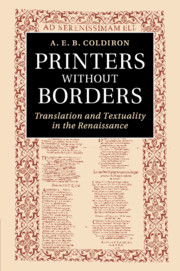
-
Select format
-
- Publisher:
- Cambridge University Press
- Publication date:
- 05 April 2015
- 09 April 2015
- ISBN:
- 9781139681056
- 9781107073173
- 9781107421561
- Dimensions:
- (228 x 152 mm)
- Weight & Pages:
- 0.7kg, 356 Pages
- Dimensions:
- (229 x 152 mm)
- Weight & Pages:
- 0.53kg, 356 Pages
You may already have access via personal or institutional login
Book description
This innovative study shows how printing and translation transformed English literary culture in the Renaissance. Focusing on the century after Caxton brought the press to England in 1476, Coldiron illustrates the foundational place of foreign, especially French language, materials. The book reveals unexpected foreign connections between works as different as Caxton's first printed translations, several editions of Book of the Courtier, sixteenth-century multilingual poetry, and a royal Armada broadside. Demonstrating a new way of writing literary history beyond source-influence models, the author treats the patterns and processes of translation and printing as co-transformations. This provocative book will interest scholars and advanced students of book history, translation studies, comparative literature and Renaissance literature.
Reviews
'Anne Coldiron demonstrates a remarkable interdisciplinary range, with literary, historical, philological and bibliographical readings of texts and evidence deftly woven together. This book is a must-read for anyone interested in the transmission of early modern literature and culture, the history of books and printing, and the role of knowledge technologies in early transnationalism.'
Alan Galey - University of Toronto
'Anne Coldiron possesses an unusual combination of gifts and a rare intellectual bite. This is an important book, with implications that reach well beyond much work in the new field of the material text, cultural history, or, indeed much of what we thought we knew about how texts travel.'
Ruth Morse - Université de Paris VII (Denis Diderot)
'Printers without Borders is lucidly written, beautifully shaped, and contains at its core a highly compelling argument. It will be of interest to scholars of the medieval and early modern periods, offering yet another reminder that we should continue to think across this divide, and to think very widely about the role and function of authorship itself.'
Hannah Crawforth Source: The Spenser Review
'Printers without Borders is an impressive and learned work of scholarship. At once witty and deeply thought, its thesis carries far-reaching implications that impinge upon material textual and translation studies as well as wider issues in canon formation and the nature of the literary Renaissance itself. It must be read by any one interested in these topics.'
Mark Rankin Source: The Library
‘Coldiron and Rossiter bring to the attention of their readers a collection of very interesting cases that reveal early modern English culture and its literary canon as the truly international and translational product it actually was.’
José María Pérez Fernández Source: Sendebar
‘Coldiron's Printers without Borders: Translation and Textuality in the Renaissance is one of this year’s best books. The book is impressive in its broad attempt to map the emergence of English national culture, including the canonical literature of English Renaissance, from an explicitly European perspective as well as its detailed account of printing and translation and how the two were intertwined.’
Graham Hammill Source: Recent Studies in the English Renaissance
‘Printers without Borders successfully illustrates how early English literature both contributed to and was shaped by a transnational fabric of literary publication and translation. Readers will do well to take up the methods of 'worldly reading' proposed in this study and to explore their operations in other contexts and among various languages.’
Andrew S. Keener Source: Philological Quarterly
‘This expansive and inclusive book is a valuable addition to our emerging scholarly tradition of work that connects material and literary histories.’
Lucy Munro Source: Cahiers Élisabéthains
‘This important book is indispensable reading for scholars of Renaissance translation studies, but its interdisciplinary scope makes it valuable for scholars of book history and Renaissance literatures, particularly English.’
Joshua Reid Source: Renaissance Quarterly
Contents
Metrics
Altmetric attention score
Full text views
Full text views help Loading metrics...
Loading metrics...
* Views captured on Cambridge Core between #date#. This data will be updated every 24 hours.
Usage data cannot currently be displayed.
Accessibility standard: Unknown
Why this information is here
This section outlines the accessibility features of this content - including support for screen readers, full keyboard navigation and high-contrast display options. This may not be relevant for you.
Accessibility Information
Accessibility compliance for the PDF of this book is currently unknown and may be updated in the future.


